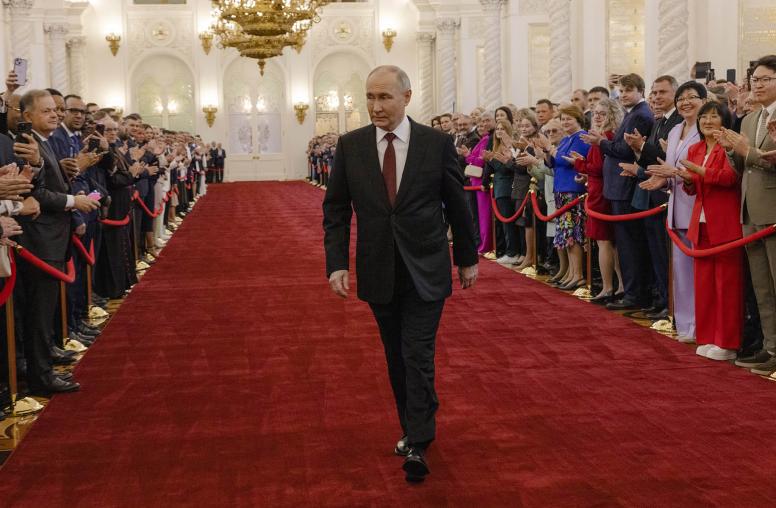Even Amid War, Ukraine Must Confront Corruption
As Ukraine battles Russian-backed forces in its eastern Donbas region, it must not let the war deter it from fighting the country’s endemic corruption, according to a panel of experts who spoke at the U.S. Institute of Peace on March 3. Indeed, the existential threat posed by Russia’s aggression can serve as a stimulus for the Ukrainian government to dismantle the systems of corruption that have dominated governance since independence, the specialists said.

Although the kleptocracy of former President Viktor Yanukovych has ended, most reforms remain pending and Ukraine continues to rank as Europe’s most corrupt state. The annual Corruption Perceptions Index collated by the non-profit group Transparency International last year ranked Ukraine near the bottom—at 142nd –among 176 countries worldwide.
“Ukraine faces a true national emergency. If this is not time to get rid of a fundamentally corrupt and dysfunctional system, then what is?” --Edward Chow, Center for Strategic and International Studies
Corruption in Ukraine has become “how the place works,” said Edward Chow, an energy and national security specialist at the Center for Strategic and International Studies. This is particularly true in the energy sector, where “literally billions” of dollars have been siphoned off every year in corrupt schemes by those connected to power, Chow said at the USIP event.
Corruption is an existential threat to Ukraine, commented Adrian Karatnycky, an analyst at the Atlantic Council. Since a key element of President Putin’s strategy appears to be to bankrupt Ukraine, the country’s leadership has “no choice” but to take clear steps to root out corruption. The influence of oligarchs and other entrenched interests remains strong and difficult to counter, the panelists said. However, Karatnycky observed that Ukraine’s newly appointed prosecutor general was taking a more assertive approach to corruption cases. It is important to successfully prosecute prominent corrupt figures to send a clear message to the Ukrainian elite that the era of impunity is over and there is a price to pay, he said.
The panel stressed the central role of civil society in driving anti-corruption efforts, notably by pressuring politicians to deliver on their promises to reduce official graft. Inna Pidluska, Deputy Executive Director of the International Renaissance Foundation in Kyiv, underlined the importance of the election to parliament of several dozen civil society activists from the 2013-14 Maidan movement, which demanded greater democracy and an end to corruption. These activists, elected in October on the tickets of several different political parties, were energetically pushing reform legislation forward, Pidluska said.
The parliament, or Verkhovna Rada, has passed laws to establish an Anti-Corruption Bureau, which will have broad powers to investigate allegations of bribery and abuse of office by senior officials. Other new legislation aims to improve transparency in public procurement, thus halting the pervasive practice of insider deals.
Obstacles to the anti-corruption campaign include resistance from the state bureaucracy, noted Professor Robert Orttung of George Washington University. And organized crime remains an influence after having become a partner of corrupt politicians during the 2010-14 administration of President Viktor Yanukovych, he said. A lack of effective campaign finance rules still lets Ukraine’s business magnates, or oligarchs, exert inordinate influence over elections—and oligarchs own the bulk of Ukraine’s mass media, particularly television channels.
Too little attention has been given to rehabilitating the civil service, a project that will take considerable time, said Pidluska. A reform of institutions will be futile, she said, if old-style civil servants remain in place at unrealistically low salaries—$250 a month for a judge or $100 a month for a police officer. Yet Ukraine has been forced to dramatically slash its government budget and is not well placed to increase salaries. Perhaps Western donors can help with this, Pidluska suggested.
Panelists agreed that to build and sustain public support for anti-corruption efforts, Ukrainians need to see success stories. A critical early project is an overhaul of Ukraine’s notoriously corrupt traffic police, according to George Kent, Senior Coordinator for Anti-Corruption at the State Department’s European Bureau. The program, funded partly with U.S. aid, will begin by replacing traffic police in Kyiv with new officers trained on a “protect and serve” model of policing. They will be paid higher salaries and bribe-taking will not be tolerated, Kent said. The project, being led by Deputy Interior Minister Eka Zguladze, a Georgian who oversaw a similar reform in her country, is then to be expanded from Kyiv to other cities.
Pidluska noted that many anti-corruption reforms, such as in deregulation, require no major funding. There is thus no reason why the war in the East or the economic crisis should impede them. Indeed more honest and accountable institutions will help fortify Ukraine and make it better able to face up to the challenge of Russian aggression, she said.
In its war with Russian-backed forces, “Ukraine faces a true national emergency,” said Chow. “If this is not time to get rid of a fundamentally corrupt and dysfunctional system, then what is?”
Colin Cleary is an Interagency Professional in Residence at USIP. He was Political Counselor at the U.S. Embassy in Kyiv from 2008 to 2012. Views expressed are those of the author and do not necessarily reflect those of the Department of State or the U.S. Government.



